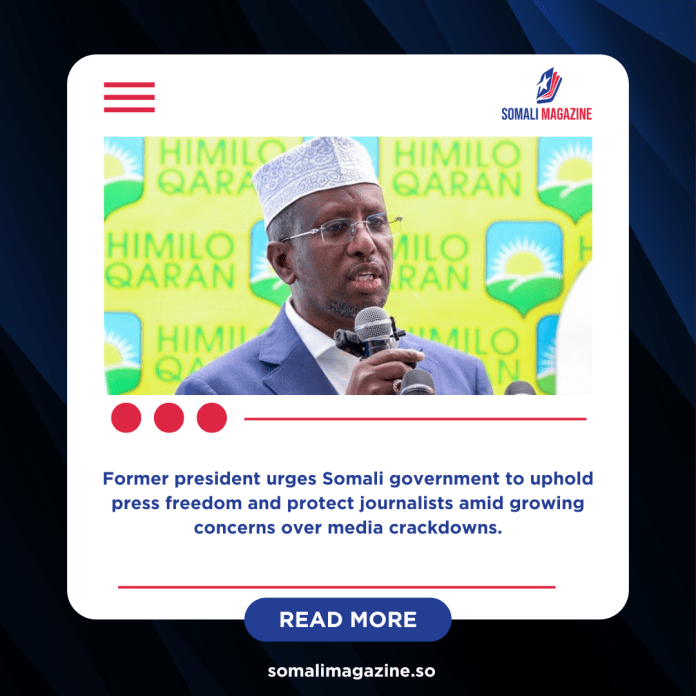Facebook Twitter (X) Instagram Somali Magazine - People's Magazine
Former Somali President Sharif Sheikh Ahmed has condemned the arrest of Himilo TV’s Director, Ahmed Mohamed Aden, and Deputy Director, Khadar Abdirahman Ibrahim, who were detained on Sunday in Mogadishu. The two journalists are reportedly being held at the Waabari District Police Station. Their arrest has sparked public outcry and drawn criticism from several political figures who view it as part of a growing pattern of government hostility toward independent media.
In a statement shared on his Facebook page, Sharif Sheikh Ahmed expressed deep concern over the continued targeting of Somali journalists, calling the arrests a troubling sign for press freedom in the country. “I am deeply saddened by the constant attacks on local media outlets, which are documented every day in an attempt to silence Somali journalists operating in Mogadishu,” he said.
The former president urged government authorities to respect the country’s Constitution, emphasizing that it guarantees freedom of expression and media independence. He noted that the responsibility to protect journalists and uphold democratic values lies with the head of state and security agencies. “The head of state and security agencies have a national duty to protect journalists, as our Constitution guarantees free media and their safety,” he added.
Sharif, who currently leads the Himilo Qaran Party, has long advocated for democratic reforms and greater media freedoms. His remarks come amid growing tensions between independent media houses and the federal government, with journalists frequently reporting harassment, censorship, and arbitrary detentions. Rights groups have repeatedly called on Somali authorities to end the intimidation of journalists and ensure that media workers can operate without fear.
The arrest of the Himilo TV executives has drawn criticism from across the political spectrum, particularly from those opposed to the current administration. Many view it as another attempt to restrict public access to independent reporting and critical viewpoints. Several opposition figures have echoed Sharif’s call for the journalists’ immediate release and urged the government to prioritize constitutional rights over political interests.
Despite the widespread condemnation, the federal government has not yet commented on the incident, and the motive behind the arrests remains unclear. This silence has fueled further speculation and frustration among journalists and civil society organizations, who say the government’s actions are undermining freedom of the press—a key pillar of democracy.
Media organizations in Somalia continue to operate under challenging conditions, often facing threats from both government forces and armed groups. The Himilo TV case has once again highlighted the fragile state of media freedom in the country and renewed calls for legal protections to ensure journalists can report without fear of persecution.
As the public awaits an official explanation, calls for justice and accountability are growing louder. Many Somalis see this case not only as a fight for two journalists but as a test of the government’s commitment to democratic principles and human rights.

